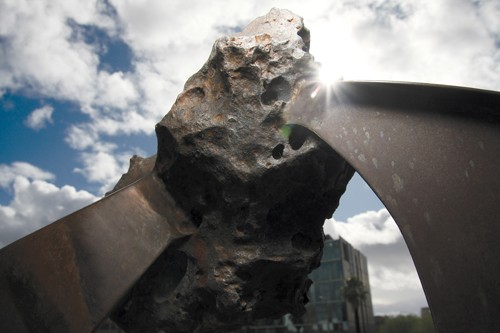The UA could receive $650 million for the OSIRIS-REx spacecraft from NASA’s New Frontiers space-exploration grant project.
OSIRIS-REx will be used to retrieve rock samples from an asteroid more ancient than Earth, providing samples for both research and museum exhibits.
If the UA lands this gig, it will be the biggest research project in UA’s history.
“”We do a lot of great studies of meteorites but we don’t understand the context,”” said Dante Lauretta, deputy chief of the OSIRIS-REx mission. “”So this asteroid return mission gives you that critical piece of information where we can say, ‘This piece came from that spot on the asteroid.'””
Lauretta noted that these carbon-rich rock samples could have organic carbons and clay minerals with water inside, possibly explaining how DNA developed.
Chris Shinohara, science operations center manager on the project, sees even more positive results for NASA and the UA.
“”People have been looking at manned asteroid missions,”” Shinohara said.
This mission would be a good precursor to such an endeavor, he added.
“”I think (this project) will help position the UA for many other opportunities out there,”” Shinohara said.
OSIRIS-REx is a proposal based on a previous proposal to NASA in a smaller contest, but this project is bigger and better, Lauretta said.
The project is six years in the making and is one of three finalists. The other two are Venus and Moon missions presented by University of Colorado at Boulder and Washington University in St. Louis.
The winner of the grant will be announced in a year and a half.
Heather Enos, the OSIRIS-REx UA program manager, says the project would definitely provide NASA more “”bang for its buck.””
“”It’s going to be much larger than the Phoenix (Mars) Lander, so it of course makes a huge financial impact on southern Arizona on the amount of dollars and jobs we can sustain,”” Enos said.
Many of those jobs will go to students from all majors. Out of the $650 million, students will work with the $125 million that will stay in Arizona.
Lauretta, deputy chief on the project, is sure of UA’s qualifications for the mission and is confident that their current team can win the grant.
“”It’s really exciting science,”” Lauretta said. “”We’ve got a great team from academics, industry and NASA, and it’s within our abilities with all of those other missions we’ve done. It will help future exploration and inspiration. Americans can be proud of an accomplishment like this.””









